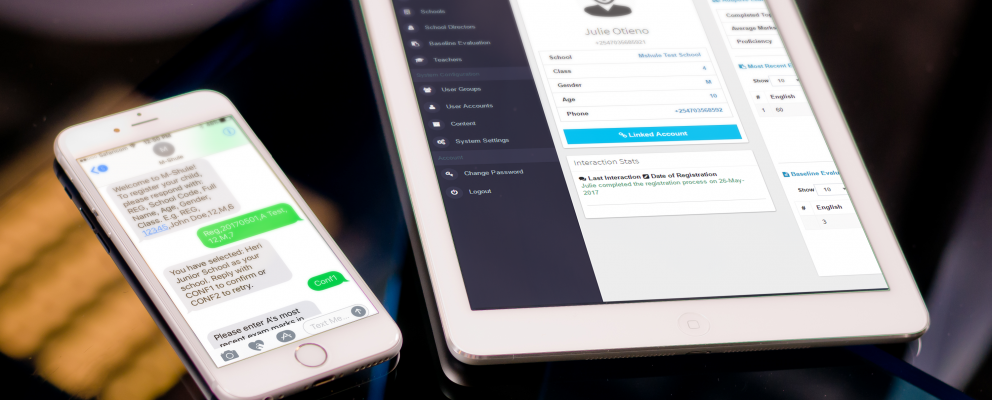
M-Shule: artificial intelligence for personalized learning
A few months ago, EWB announced its investment in M-Shule, a Kenyan-based EdTech company using SMS to deploy tailored education content for children in sub-Saharan Africa. With school back in session, EWB Investment Officer Elena Haba checked in with Claire Mongeau, the CEO and founder of M-Shule, to discuss what motivated Claire to create M-Shule and how her background has helped her design the venture to be as impact oriented as it is today.
Elena Haba (EH): For anyone who may be unfamiliar with your organization, could you tell us a bit more about what your company is doing?
Claire Mongeau (CM): Sure! M-Shule means “global school” in Kiswahili, and we operate an adaptive learning platform based in Nairobi in Kenya. We create personalized learning experiences using artificial intelligence and SMS for learners in low income areas who need it the most. We use an adaptive learning engine that personalizes lessons for students to help them get to where they need to be. And then we also analyze the data and provide insights and recommendations to their parents, teachers and school.
We believe that through this approach, we are able to improve learning outcomes for students and create better opportunities for them – especially for the students who need it the most.
EH: What led you to create M-Shule and to work in the EdTech space?
CM: My origin story so to speak is that I grew up with a mom who was a special education teacher in primary schools. I grew up being really interested in all of the investments and hands on effort that goes into creating better learning for each individual child’s needs. I always thought there must be a way to receive that kind of support, especially for those who live in under-resourced areas.
I came to realize that personalized attention yields better learning outcomes, and that there are amazing innovations happening around the world in technology that could drive those learning outcomes. So I was really fascinated by the things that were happening in the United States and the Western world in adaptive and personalized learning, and how we could apply that to technology that is so prevalent here in east Africa – mobile and SMS. So I thought, why can’t we just apply these themes, the same sort of power in learning in a way that everyone can access? And that’s what brought me to create M-Shule!
EH: Could you give us an example of one of the schools that you’re working with, and talk a bit about the impact that M-Shule has had on them?
CM: Definitely. We launched our pilot, thanks to EWB, at the end of May, and have been operating a trial in 17 schools throughout Nairobi – schools in low income areas. One of these schools is based in Kibera, which is one of the largest slums in east Africa, where a lot of the parents don’t have a huge source of income. There’s a low-cost private school that operates in Kibera to serve the needs of those children. This is a school that is serving similar sorts of community that public schools will serve, but is trying to provide extra resources and extra value by bringing in different sorts of programs like ours.
We began working with a school called Cheery Education Centre in May with full support of the director and head teachers and launched their program across their sixth grade class. So far, we’ve gotten outstanding feedback from the students, parents and teachers.
My favourite bit of feedback from the students is that it’s helped them make friends. Because they go home and practice their questions there and when they come to school, they help each other out.
A lot of students are also saying they are doing better at their exams. There’s one student who said she used to hate math class, she felt she wasn’t good at it, she never enjoyed it… but she started using M-Shule and it improved her score, she went from 30% to a 75%.
Of course this is just the beginning, but we’re really excited to see the value people are finding in it, and excited to grow our impact.
EH: How has the support of EWB helped M-Shule grow?
CM: We’ve only been working with EWB for a few months now, but have already gained a huge amount of value and support from EWB. The support we received allowed us to actually launch our pilot, which was incredible. But then the support from the team has helped us refine our strategy, different ways of engaging our users, different ways of thinking about our product. Not to mention, we’re about to get our very first EWB Fellows next month, which will be instrumental in our partnership, and will help us improve our data analysis and communications.
For a company that’s working in artificial intelligence, you need to be really good at all of those things – understanding the data and then talking about it. So we’re really excited to grow in our partnership with EWB because I think that’s going to be one of the big ways we’re going to succeed.
Donate to EWB so we can support more great enterprises like M-Shule >
